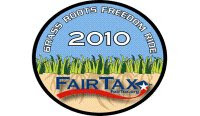I thought about saying I felt old, so no blog today, but then decided to tell the truth. I was just lazy today and did nothing! And tonight the Football game came on and - well - as the saying goes, "there goes the ballgame".
Talk to you again tomorrow.
Subscribe to:
Post Comments (Atom)

2 comments:
(Okay, Bobbie, I'll stand in:) Mike Huckabee's ardent support for the FairTax Act of 2007 (HR 25/ S 1025) represents a power shift of massive proportions in America. It lays out a practical ideal of voluntary payment of taxes, based on a substantial level of taxpayer choice that the plan affords. Since FairTax untaxes basic necessities (up to socially-accepted poverty-level spending), what is taxed is marginal, and/or desired or preferred, on a broader base of retail products and services. This is to say that the taxpayer may, under the FairTax, choose to purchase used products and avoid paying the tax. And, to the extent desired, the taxpayer may choose to self-perform certain services rather than pay for them. This will stimulate do-it-yourself education, improve citizens' self-reliance; indeed the FairTax represents the possibility of ushering in a new can-do, citizen psychology that would accrue to greater demands for government accountability - truly, a cultural sea change.
Government is the "necessary glue" that enables the social fabric to cohere. It does this by effecting "rules" that ostensibly provide members with equitable access to wealth and resources. It also must provide ostensibly equitable enforcement of those rules in order to mitigate threats to the social fabric. It is unrealistic to believe that the structures of a national government can be supported on donations, thus the need for taxes. Naysayers love to characterize anything purporting to be a "fair tax" as an oxymoron - but it is not true. The idea of fairness has to do with equitable sharing in the cost by all members who depend upon the social fabric for food, shelter, clothing and post-necessity economic enterprise. And, because of the shift of power from politicians and special interests under an enacted FairTax, the elected will find it more difficult to both enlarge government, and implement any dual system of taxation. FairTax strategist, Dennis Calabrese, discusses how the FairTax repeals the income tax, how it does away with the IRS, and how it addresses other aspects of frequent concern to skeptics.
The FairTax has a much greater opportunity for success to operate as a "self-regulating" mechanism because of increased visibility. One finds that the current system, ostensibly regulated by the Internal Revenue Code, is in fact poorly regulated because of continually increasing complexity (the effect of tax favors from politicians, through lobbyists, to favored corporations and other special interests) stemming from the desire by those holding government position to steer public behavior using tax code "carrots." We have seen how 100 years of this type of behavior has eroded the Nation's currency and the purchasing power of working family incomes. "Visionist," Tom Frey believes the current tax system will simply collapse; and economist Laurence Kotlikoff heralds - short of enactment of FairTax (or an otherwise unlikely change in spending habits) - the U.S. will shortly face an irrevocable economic breakdown. (Kotlikoff believes that passage of the FairTax can stave off the economic ruin we're facing, but would be surprised to see it happen.)
Frey and Kotlikoff may be right on both counts, and we may not be able to successfully evoke change; but shall we not try?
Mike Huckabee believes we should.
(Permission granted to republish, in whole or part. -Ian)
Wow! I kind of wish the football game hadn't won out, because then, I might not have felt compelled to try to rain all over Ian's parade!
Ian, there is very little "voluntary" about a consumption tax for us average citizens. Choosing to purchase "used" goods and services is a Fairtax myth by and large. There are no used services, and services make up half of the average family budget. There are no used groceries, no used restaurant meals, no used gas or heating oil, nothing used at Wal-Mart, etc. etc. Look at your own annual budget and try to find a purchase that could have been "used" in order to avoid federal tax. I tried and could not find one single used eligible item. And remember, those that do buy their underwear at Goodwill won't be saving any additional money due to the embedded cost of the Fairtax--although it's true that no revenue will go to the federal coffers from that transaction.
As for performing certain services and your forecast "growth of self reliance", anyone can do that today. Give yourself a haircut, or repair your car? Sure-lots of folks do that today. What changes under the Fairtax?
I certainly agree with you and Larry K that there is a budget train wreck looming in our future, but changing the way the federal government collects revenue won't solve the problem. And the $600 billion Fairtax cash grant entitlement, which you call a prebate, will only accelerate the train wreck. Entitlements are rapidly squeezing out discretionary spending including national defense. Adding the prebate entitlement to the list of current entitlements would raise the entitlement share of the federal budget from 60% to around 70% and that's not good.
Ian, you can certainly try to push forward the Fairtax scheme, but I truly wish you were spending your energy working the real problem--out of control federal spending. Why not at least find a candidate who, as a minimum, would promise to set up a task force or commission charged with reducing the size and cost of the federal government by 10% in the first year? That person I'd vote for!! Changing the way revenue is collected is a fools errand!
Good luck!
Post a Comment